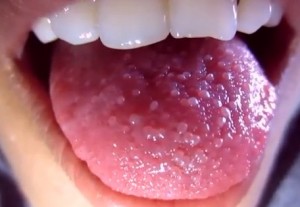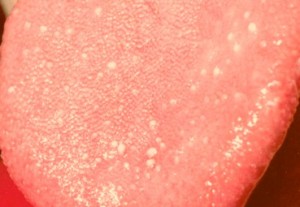Enlarged Papillae
Papillae refers to small strand-like growths that are naturally present on the tongue. Enlarged papillae can occur due to varied causes, including underlying conditions like gastrointestinal disorders, canker sores, etc.
Most instances of enlarged papillae are mild and clear out on their own. Severe and chronic cases may require medical attention.
Before understanding the reasons and causative factors of papillae enlargement, it is important to know the different types of papillae. They are of 4 main types as listed below:
Enlarged papillae usually does not result in any adverse health complications. It is also possible for patients to experience enlargement of papillae as part of some other underlying disorder. A few common causes of enlarged papillae are listed below:
Enlarged papillae may also occur due to the below listed causes:
Treatment of enlarged papillae is aimed at finding the underlying cause, managing any additional symptoms, and curing it with medications and varied medical therapies. Most instances of enlarged papillae, including transient lingual papillitis are mild and often clear out on their own. Patients may opt for home remedies to find relief from associated symptoms. Severe and persistent instances require medical attention. A few common treatment options and home remedies are listed below:


Papillae refers to small strand-like growths that are naturally present on the tongue. Enlarged papillae can occur due to varied causes, including underlying conditions like gastrointestinal disorders, canker sores, etc.
Most instances of enlarged papillae are mild and clear out on their own. Severe and chronic cases may require medical attention.
Types of papillae
Before understanding the reasons and causative factors of papillae enlargement, it is important to know the different types of papillae. They are of 4 main types as listed below:
- Circumvallate papillae: They are located at the back end of the tongue and help in detection of bitter flavors. They occur across the rear end of the tongue and taper as they reach the throat giving itself a ‘V’ shape. Only 10 to 14 circumvallate papillae occur in most people.
- Foliate papillae: They occur on each side of the tongue. They can be categorized into two groups, wherein each cluster exhibits an elongated crease or fold.
- Filiform papillae: They are long, slim, and also occur in a V shape. They are the most common and widespread type of papillae on the tongue. They offer a protective cover to the tongue and help in detection of sour flavors.
- Fungiform papillae: They may be seen to occur all over the tongue, but are most prevalent on the front section of the tongue as well as the sides. Their shape is similar to that of mushrooms. Fungiform papillae help in detection of sweet and sour flavors.
Causes of enlarged papillae
Enlarged papillae usually does not result in any adverse health complications. It is also possible for patients to experience enlargement of papillae as part of some other underlying disorder. A few common causes of enlarged papillae are listed below:
- Tongue irritation: Different kinds of tongue injuries, habits like biting the tongue, and use of ill-fitting dentures can harm the tongue surface. Eating food that is very hot can result in papillae burns. Intake of food that is extremely spicy, acidic, or salty can cause adverse effects on the tongue. In addition to these common factors there are many other causes which can irritate the tongue and increase its risk to infections, thereby leading to enlarged papillae.
- Canker sores: It is a type of viral infection marked by formation of sores and other abnormalities in the oral cavity. It is one of the most common causes of enlarged papillae. Also called mouth ulcers, it can also occur due to certain genetic disorders as well as an impaired immune system. Underlying presence of varied kinds of bacterial, fungal, and other pathogenic infections of the mouth can also trigger the onset of canker sores. For example, oral thrush facilitates attack of the oral cavity by additional viruses and germs, thereby causing canker sores and enlargement of papillae.
- Gastrointestinal conditions: The presence of different kinds of gastrointestinal problems such as GERD, acid reflux, peptic ulcers, and ulcerative colitis, etc., can also trigger the onset of enlarged papillae.
- Transient lingual papillitis/lie bumps: It is a minor inflammatory condition marked by small red or whitish lumps as well as enlarged papillae. It is usually observed to be localized in the dorsal section of the tongue which is home to the fungiform papillae. Additional symptoms include burning, numbness, and/or tingling sensations on the affected part of the tongue. The area also consists of many nerves, which can result in occasional tongue pain.
- Smoking and alcohol abuse: Excessive smoking as well as increased intake of alcohol on a regular basis can cause irritation of the tongue, thereby causing enlarged papillae.
Enlarged papillae may also occur due to the below listed causes:
- Deficiencies of vitamins like B complex, minerals, and other nutrients.
- Contact of the tongue with insecticides, toxins, and other chemicals.
- Enlarged papillae can also occur as part of the spectrum of symptoms associated with certain food allergies, drug allergies, etc.
- Enlarged papillae that persists for over two weeks needs to be checked by a doctor for presence of oral cancer.
Treatment
Treatment of enlarged papillae is aimed at finding the underlying cause, managing any additional symptoms, and curing it with medications and varied medical therapies. Most instances of enlarged papillae, including transient lingual papillitis are mild and often clear out on their own. Patients may opt for home remedies to find relief from associated symptoms. Severe and persistent instances require medical attention. A few common treatment options and home remedies are listed below:
- Oral cancer is treated via surgery, chemotherapy, and radiation therapy.
- Chewing mint leaves, gargling with lukewarm salt water solution, and avoiding the intake of excessively salty, spicy, acidic, or hot food can help alleviate and prevent mild cases of enlarged papillae.
- Quit smoking. It not only causes enlargement of papillae, but also increases the risk to development of oral cancer. Also, limit the intake of alcohol or completely avoid it.
- Cold compresses, intake of cold juices and fluids, and use of ice cubes on the affected parts of the tongue can help decrease pain and discomfort.
- Oral thrush and other minor fungal and yeast infections can be managed by gargling the mouth with diluted tea tree oil solution, eating yogurt, and application of yogurt on the affected parts of the tongue. Severe oral thrush and other fungal infections may be treated with topical and oral antifungals.
- Canker sores may be treated with OTC creams and pills.
- Ill-fitting dentures that cause tongue injuries need to be changed. Stop the habit of tongue biting. Pain, infection, and enlarged papillae caused due to tongue trauma can be eased with the use of glycerin.
- Overgrowth of oral bacteria and other germs can be reduced via intake of soups containing pepper, ginger, and garlic as well as gargling with sesame oil.
- Intake of varied supplements can help overcome any nutritional deficiencies.
Enlarged papillae on tongue – pictures


No comments:
Post a Comment